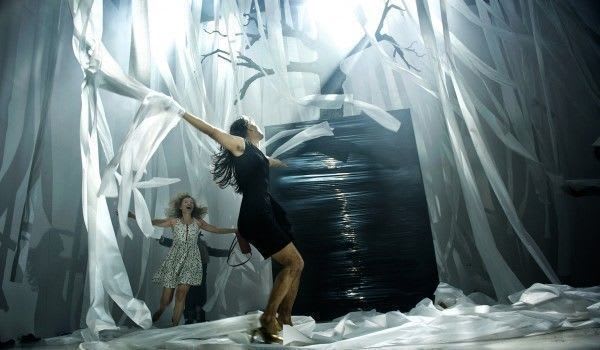This year's World Shakespeare Festival has been an extravagant mix of the sacred and profane, so who better to bring it to a worthy climax than Calixto Bieito?
Rather than choosing a single play, the Catalan director has taken a Shakespearean theme and run riffs over it during a typically unpredictable 100 minutes.
In many of his plays such as As You like It and A Midsummer Night's Dream, Shakespeare features scenes set in forests but, other than the odd postgraduate student, nobody is ever likely to have thought of bringing them together in a single work, let alone put it on stage.
Following on from the Vakhtangov Uncle Vanya, which opened the previous night, it appears that Samuel Beckett is alive and well in the minds of today's most distinguished European auteur-directors.
In addition to a sad tree that could easily have graced any recent production of Waiting for Godot, there is also a scene in Forests during which Josep Maria Pou presents Shakespeare using the methodology of Krapp's Last Tape.
As always with Bieito, there is tremendous variety in the staging, performance and pacing. Rebecca Ringst’s typically shiny, modernistic set eventually deconstructs almost of its own volition, leaving the tree hanging without support from below while adorned with symbolic red balloons.
The look is enhanced with music from a kind of Spanish Polly Jean Harvey, Maika Makovski, who is equally proficient on guitar and keyboard. The singer-songwriter who also get involved in the acting to an extent starts off in laid-back mood before ramping up the tempo and volume as the night gets wilder.
The extracts from the Bard's texts are delivered not only in English but also Catalan, with every one of the six actors being obliged to speak not only in their native tongue but also the other, which can make comprehension a little difficult, although there are English subtitles (unusually at stage level) to assist where required.
On one level, this is an evening of theatrical poetry, with the best of the verse speaking in English by George Costigan and Katy Stephens, while Roser Cami gives a really gutsy performance for the Iberian team.
The words are only part of the experience, since the actors also introduce measures of frivolity and tragic depth at various stages, swapping costumes with gay abandon and happily throwing soil around and chasing each other across the stage in the interests of visual stimulation, if not always deeper meaning.
Perhaps one way of getting into the experience is to use Shakespeare's "seven ages of man" speech as an a starting point and indeed, everything from the little infant to death in old age (the Lear scenes being particularly moving) is present at some point. An alternative might be to consider the pleasures and dangers of walks in forests, which both Shakespeare and Bieito are experts in contrasting.
Ultimately, the best way to enjoy Forests is probably to allow the sounds and visions to flow without being too critical or worrying excessively about which plays have yielded up which lines or the underlying context that would mean so much in a regular production of a single play.
Anyone who is tied to dramatic structure and narrative continuity will absolutely hate this performance. Those who are more open to unique, unexpected insights and inexplicable pleasures ought to have a whale of a time.


